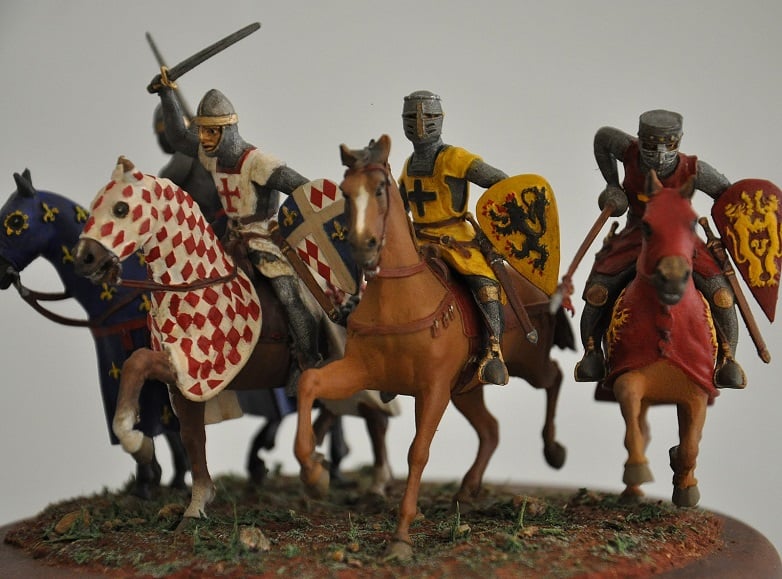Have you heard about the forgotten martyrs in the Bible? Our Bible heroes murdered these men, women, and children because of their faith.

Birinci Haçlı Seferi (1096-99) ‘‘Kutsal Toprakların Fethi,,
Antiokheia [Antakya] Kuşatması (Ekim 1097-Haziran 1098)
A History of Violence
Religious history recounts stories of violence and persecution against Jewish and Christian people. While these stories are well known, we must reflect on the narratives of those whom we ourselves have martyred. The Bible itself presents instances where individuals were killed for their faith, often perpetuated by religious leaders. When we get honest with ourselves about what the Bible says, we have to admit the terrible deeds done by people of faith. Then we will see the importance of embracing love as the true nature and way of God. If we’re going to move forward into a more peaceful future, we must re-evaluate our perspectives on faith and violence.
Jewish and Christian Martyrs
Judaism and Christianity honor many martyrs who died for their faith. Judaism counts Samson and Jonathan as martyrs of the faith because they chose to die rather than give in to pagan powers. History records that the prophet Elijah was sawn in half. Shadrach, Meshach, and Abednego miraculously escaped martyrdom by the appearance of a fourth man in the fire, who preserved them alive. When we think of New Testament martyrs, we often remember people like Stephen the deacon, John the Baptizer, and Jesus. Christian history tells us that every one of the original apostles died a martyr’s death, except John the Beloved. But there are many forgotten martyrs in the Bible—those whom our heroes killed because they believed differently.
Forgotten Martyrs in the Bible
While we honor the Jewish and Christian martyrs, most of us are reluctant to call the pagans we killed “martyrs.” This is because in our understanding of history, we favor ourselves. Yet, fairness requires that if we are going to apply the term to our own heroes we should also use it for others whom we killed because of their religion. Here are a few examples of forgotten martyrs in the Bible:
- Exodus 22:18 adjures the Jewish people not to allow a witch to live. Since laws are usually written after an incident that necessitates them, it’s a safe assumption that this law is a response to, and justification of, witch hunts conducted by Hebrews against their Gentile neighbors.
- Exodus 32:25-29 describes Moses ordering the execution of 3,000 people who worshiped the golden calf.
- 1 Kings 18 portrays Elijah’s confrontation with 450 priests of Baal. After God defeated their religious beliefs with a miraculous bonfire, the Hebrew prophet had every pagan priest put to the sword.
- 2 Kings 23 details Josiah’s reforms. He’s touted as a hero of the faith because he tears down altars and slaughters pagan priests of the high places.
Implications and Consequences
Unfortunately, these stories contributed to a historical mindset among some Christians that justifies violence towards others based on faith. The Crusades, Inquisition, and Salem witch hunts are examples of how this mindset manifested throughout history. Forced conversions of enslaved Africans and Indigenous people further demonstrate how good Christians are at martyring those whose cultures and beliefs are different. Christian hatred towards and violence against LGBTQIA+ folks is not just a modern thing—it’s just begun to make the news in the past decades.
A Vengeful God and Human Violence
Beliefs about a vengeful God and the notion of eternal damnation for non-believers have sometimes fueled a justification for violent actions. When you believe God is wrathful, this justifies your own wrath. If your God burns people in hell, then you’re being godly if you burn down non-Christian villages. If God punishes evildoers, it’s easy to make yourself heaven’s agent to mete out divine retribution.
I’ve even heard kinder, gentler souls who justified the Canaanite genocide. “God sent the Israelites to wipe out indigenous Canaanites as agents of mercy,” they say. “Because if those Canaanite children had been allowed to grow up, they would have become sinners themselves, and would have been doomed to hell. So if you think about it, killing them before they reached the age of accountability was a kindness.” See how a belief in divine wrath and damnation can justify the most terrible of actions!
Embracing the Loving Nature of God
If we are going to grow as believers, we must challenge and transform these interpretations. What if we honestly believed that God is love, as Jesus emphasized in his teachings? In John 14:9, Jesus stated, “If you have seen me, you have seen the Father,” implying that God’s essence is reflected in love. This transformative understanding compels us to evaluate and redefine what is truly godly, centering it on love and compassion. Anything that doesn’t look like Jesus isn’t of God. Thus, violence in the name of religion is of human origin at best, and demonic at worst.
Re-evaluating Faith and Violence
By embracing the concept of a loving God, Christians can begin to re-assess our perspectives on faith and violence. Love becomes the guiding principle. We come to recognize that violence as an act of faith is contradictory to the divine nature. 1 John 4:16 says, “So we have come to know and to believe that love that God has for us. God is love, and whoever abides in love abides in God, and God abides in him.” As an expression of love, Christians must seek understanding, dialogue, and peaceful resolutions, even in the face of differing beliefs.
Facing the Forgotten Martyrs
We cannot move forward in our spiritual growth, much less into an age of mutual growth and human solidarity, until we face the forgotten martyrs. Our own heroes have killed countless faithful people because of their different cultures, beliefs, practices, and religions. The fact that we consider them heroes for doing so betrays a lot about our ideals.
Reflecting on our own history of religious violence and persecution raises important questions about our faith traditions. It also reveals the darker side of the way we understand God. By acknowledging those we have martyred and embracing a vision of God rooted in love, we can challenge the narratives that justify violence. We can work towards fostering a world guided by compassion, understanding, and respect for all individuals, regardless of their beliefs.
For further reading, check out these related articles:
- The Chosen People and Guns: Our History of Supremacy, Violence, and Genocide
- What if the Church Focused On Its Own Sin Instead of the Sins of Others?
- What I Don’t Believe about Hell
- American Thanksgiving and God’s Chosen People
- The Gospel: Good News for Whom?













